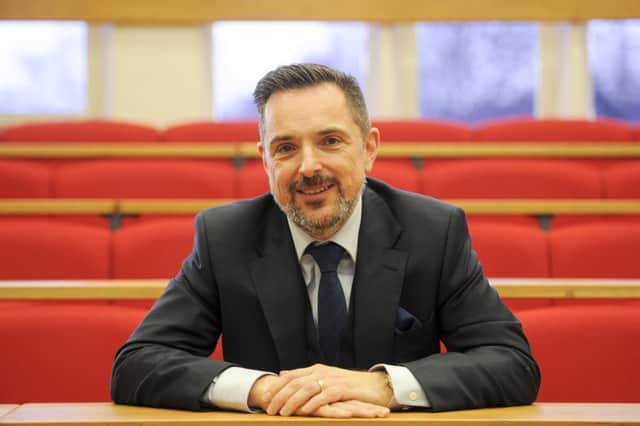From annoying Madonna to talking with Taylor - How Yorkshire’s George Ergatoudis became one of the most important men in music


Distant are the days when radio, TV and traditional record shops held the keys to audiences’ listening habits, as the explosion of streaming services has introduced a whole new way of deciding which acts get heard through their inclusion on all-important playlists.
George Ergatoudis has worked on both sides of the fence. As a top boss at BBC Radio 1 in the years before online apps truly took hold, he had ultimate responsibility for deciding which tracks got regular airplay, making him arguably the most powerful figure in the industry. Now as
Advertisement
Hide AdAdvertisement
Hide AdApple’s UK and Ireland head of music – having moved to the tech giant in 2018 after a spell as Spotify’s chief tastemaker – he sets the trends that resonate with those seeking fresh sounds on the most modern of platforms.


Ergatoudis’ deep interest in the strategic side of the business stems from the fact that he is, at heart, a music addict – a love that began in Yorkshire.
Growing up in Leeds, he was influenced by his father John, a civil engineer who - as well as being a president of the local Magic Society - played songs from his Greek Cypriot roots, while his mother Pauline was into rock’n’roll. Then, when deciding where to study as an undergraduate in the 1980s, Sheffield University came first as the groups he loved all began in the city, from ABC and The Human League to Cabaret Voltaire and Heaven 17.
“I was into dance culture and electronic music,” says Ergatoudis, who has just returned to his former university to be presented with an honorary doctorate. “All those acts had roots in it, particularly Cabaret Voltaire. As a big John Peel listener, I could appreciate good pop but I was very much into alternative stuff.”
Advertisement
Hide AdAdvertisement
Hide AdSmartly suited and sporting a neat beard, Ergatoudis manages to strike the fine balance between corporate discretion and affability - no mean feat, considering Apple’s legendary secretiveness.
He graduated with a degree in architecture in 1986, but as early as his first year he wasn’t convinced that a career designing buildings was for him. He co-founded a fanzine called Babel – “To get into gigs for free and interview artists we loved,” he says sheepishly – and later started Signs, a listings magazine conceived as Sheffield’s answer to Time Out in London.
Simultaneously, Ergatoudis was learning the broadcasting ropes through a youth access programme with BBC Radio Sheffield. Wayne Garvie – now president of international production for Sony Pictures Television – was also part of the scheme, and together the pair moved to Manchester before Ergatoudis secured a coveted position as a trainee producer with Radio 1.
“There were over 2,000 candidates, and they actually told me they liked the fact I’d done architecture,” he recalls. “So many others had done media studies or things that didn’t stand out as much.”
Advertisement
Hide AdAdvertisement
Hide AdFollowing stints at Island Records and Kiss FM, Ergatoudis found himself back with the BBC producing shows for Jo Whiley and Simon Mayo. He was instrumental in the launch of urban music network 1Xtra, ahead of his appointment as Radio 1’s head of music in 2005.
In an episode that highlighted the authority he wielded, Ergatoudis wound up at the centre of a controversy when Madonna’s single Living For Love failed to make the R1 playlist in 2015. The pop star called the decision ‘discriminatory and unfair’, but Ergatoudis said the youth-oriented station had ‘moved on’ from her music.
Did such a degree of power sit well with him? “It’s not something you think about,” he says. “I’ve never been an egotistical person, I’ve never been obsessed with power. You do feel the gravitas, but at the same time if you dwell on that you just can’t do the job. You have to play straight and fair –this is affecting people’s livelihoods, potentially. We took it super seriously.”
The Streets, Dizzee Rascal, Adele and The 1975 have all benefited from Ergatoudis’ enthusiasm. “There’s a lot of artists that I hope, through my passion, I played a small part in helping them break through.”
Advertisement
Hide AdAdvertisement
Hide AdHe believes Radio 1 has a bright future, despite the challenges it faces from streaming. “Radio, when it concentrates on its unique properties, is about being in the moment and how you can add context. That’s what Radio 1 is brilliant at doing.”
Ergatoudis went to Spotify in 2016. He had been speaking at a conference in Stockholm where the company is based and visited its headquarters before a job offer materialised. Quickly promoted to the rank of head of music culture, international shows and editorial, he was very hands-on. He personally met Taylor Swift’s record label boss on one occasion in a bid to bring her work back to Spotify after she pulled her back catalogue from the platform.
Swift took issue with the way the firm compensated artists, a point Ergatoudis says is ‘all about the deals’. “It’s not down to the streaming business model or anything. It’s literally down to the legacy deals that artists have done.”
The argument about the principle of streaming has now been won, he says. “As far as I’m aware in the UK, and probably I’m going to eat my words, there are no artists left that really don’t understand. There are some that might not be utterly happy with streaming, but frankly they’ve realised this is the future of music consumption and they have to be on board. It’s more than proven its success and the inevitability of it has happened now.”
Advertisement
Hide AdAdvertisement
Hide AdApple’s emphasis on ‘the value of human curation’ prompted him to join the organisation. In 2015 while still at the BBC he described Apple as a ‘disruptive monster’, a quote he winces at today. “You say things at the time in fear, with the lack of knowledge. That was coming from my perspective at the time – a very bold, big statement. It’s not that I regret it, but it’s just that I don’t think that has come to pass at all, and in fact the rise of streaming has been phenomenal for music fans. From the point of view of an artist, streaming has radically changed the landscape in so many ways, particularly the opportunity for new artists to actually be discovered. And there’s still lots of growth to come.”
Ergatoudis is in his early fifties but his appetite for the new hasn’t waned – he raves about Celeste, the winner of the BBC’s Sound of 2020 contest, and Scottish singer-songwriter Aaron Smith. He lives in Surrey near Hampton Court with his wife Alexa in a house they built themselves.
The couple met when she was designing record sleeves, and their sons Josh and Toby - who are both involved in music - have been urging their father to style himself ‘Dr Ergatoudis’ after his recent trip back to Sheffield to receive an honorary degree. Ergatoudis thinks the idea is hilarious. “It’s a fabulous honour but realistically... I’m not going to use ‘doctor’.”
Artists ‘still value importance of albums’
Ergatoudis says he has changed his mind about the future of albums in the last few years having previously claimed streaming services could bring about the end of their existence.
Advertisement
Hide AdAdvertisement
Hide AdIn 2014 Ergatoudis – a man who once owned more than 30,000 vinyl records – sounded the death knell for albums, claiming they were ‘edging closer to extinction’ as listeners preferred individual singles, but he adopts a different tone in 2020.
“I’ve talked to Taylor Swift and other artists about it, and they like the ability to have definitive moments in time in their career,” he says. “Apple really strongly believes in albums as a body of work, and we make sure we promote and represent that more clearly than Spotify does.”